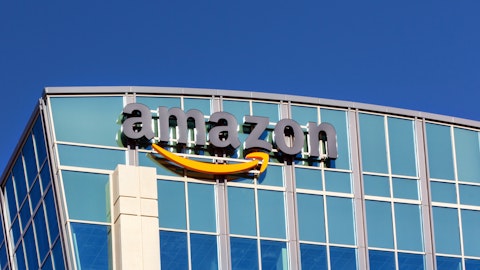2. Tesla Inc (NASDAQ:TSLA)
Number of Hedge Fund Investors: 99
Jim Cramer in a latest program discussed the market uncertainties stemming from President Trump’s tariff policies and said the following about the Mag. 7 group of stocks.
“You can buy some low multiple techs, industrials, and banks here. We did that for the charitable trust today, right under the teeth of the selloff. I would not jump back into the Magnificent 7 because, as of tonight, there is no “Mag 7” anymore. I came up with that name, and I’m scrapping it right now — no moniker fits the two or three that remain viable. And I’m not going to put it out there — there’s nothing magnificent about Tesla or Nvidia.”
Tesla’s EV sales are falling all over the world as the company faces challenges from competitors. Even if Elon Musk increases his focus on fixing the company’s problems, it would take a lot of effort to come out of the demand crisis. For example, in California, the largest U.S. market for electric vehicle adoption and sales, Tesla sales fell about 12% year over year in 2024, causing its market share to drop from 60.1% in 2023 to 52.5% in 2024. Was it because Californians are buying fewer EVs? No. Californians purchased more than 2 million electric cars during the year, almost double when compared to the past two years.
Things aren’t looking good for Tesla in Europe, either. For example, in Germany, Tesla delivered just 1,429 new cars in February, down 76% from the same month last year. In contrast, battery-electric vehicle (BEV) registrations surged 30.8% during the month.
Tesla Inc’s (NASDAQ:TSLA) product lineup is showing signs of stagnation, with over 95% of sales still coming from the Model 3 and Model Y. Meanwhile, competitors are rolling out more advanced models. According to Reuters, Tesla’s market share in Europe is slipping as legacy automakers like BMW post stronger sales. Chinese competitor BYD is also gaining ground in Europe, despite talk of tariffs.
Polen Focus Growth Strategy stated the following regarding Tesla, Inc. (NASDAQ:TSLA) in its Q4 2024 investor letter:
“The largest relative detractors in the quarter were Tesla, Inc. (NASDAQ:TSLA) (not owned), Thermo Fisher Scientific, and Broadcom (not owned). We’ve spoken at length about our rationale for not owning Tesla. The stock enjoyed a 54% return during the quarter, with effectively all of the share price performance strength coming in the post-election period, as the market expressed a positive view on Elon Musk’s prominent role in the incoming Trump administration and its potential implications for Tesla. While we agree this development should be a net positive for Tesla and recognize the company’s interesting future prospects for autonomous driving and humanoid robots, its current valuation demands that shareholders pay primarily for potential innovations that have yet to materialize, with uncertain risks and timelines, presenting a different type of risk profile than we are comfortable with. Today, Tesla is an automobile manufacturer limited to the higher-income segment and is increasingly challenged to sell vehicles when interest rates are not zero. As such, we continue to question the company’s long-term growth profile, its ability to scale a large robotaxi service (which seems to be the source of euphoria in Tesla shares), and its corporate governance.”





